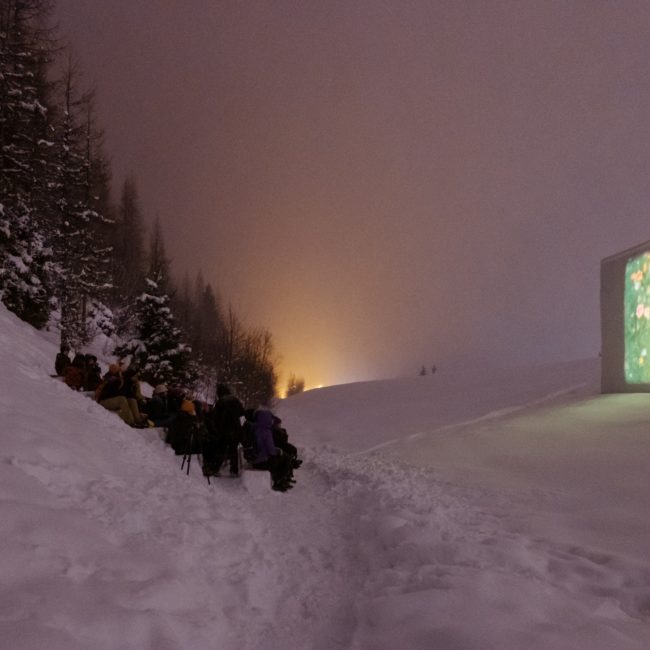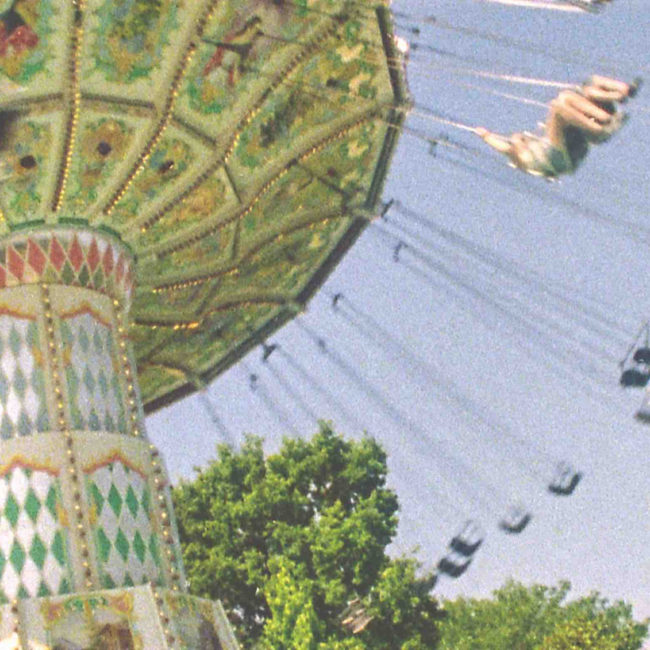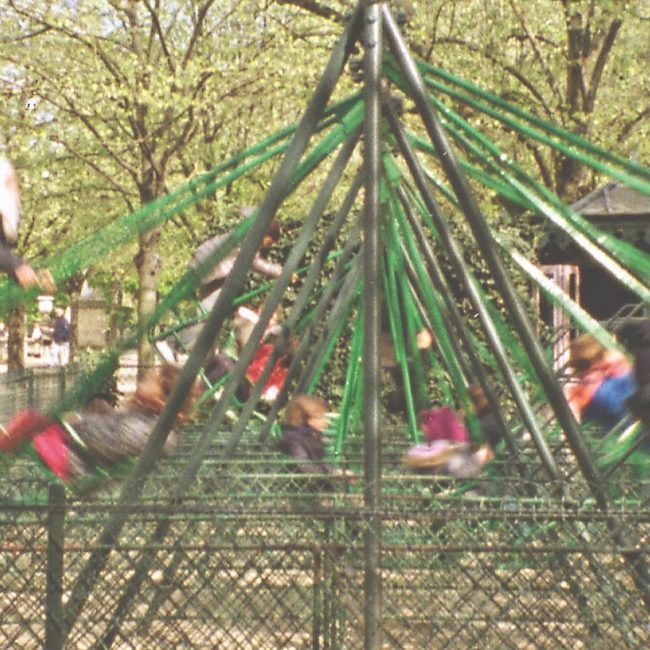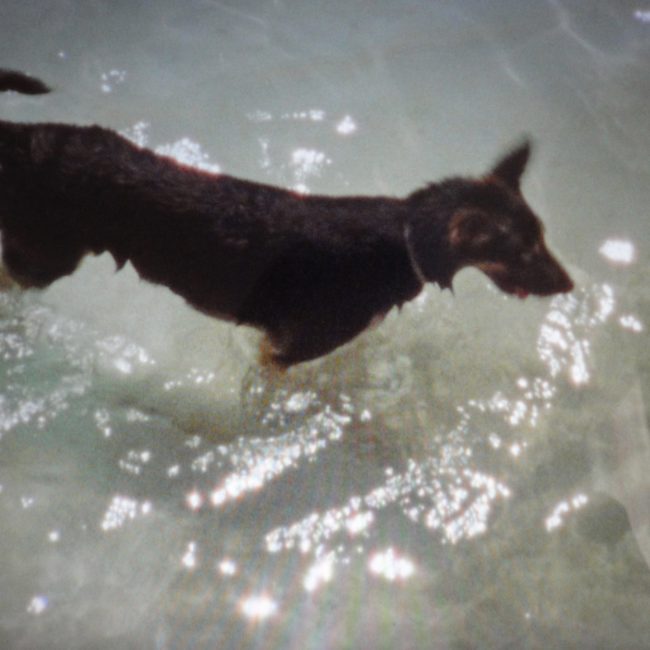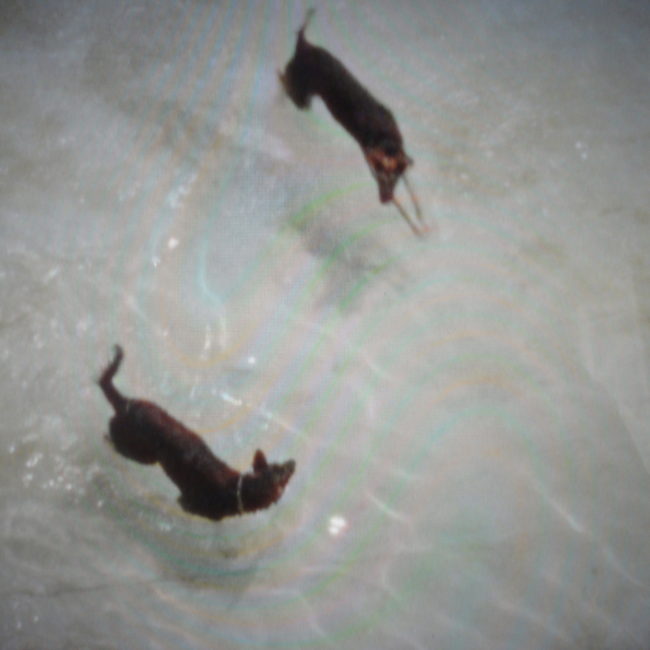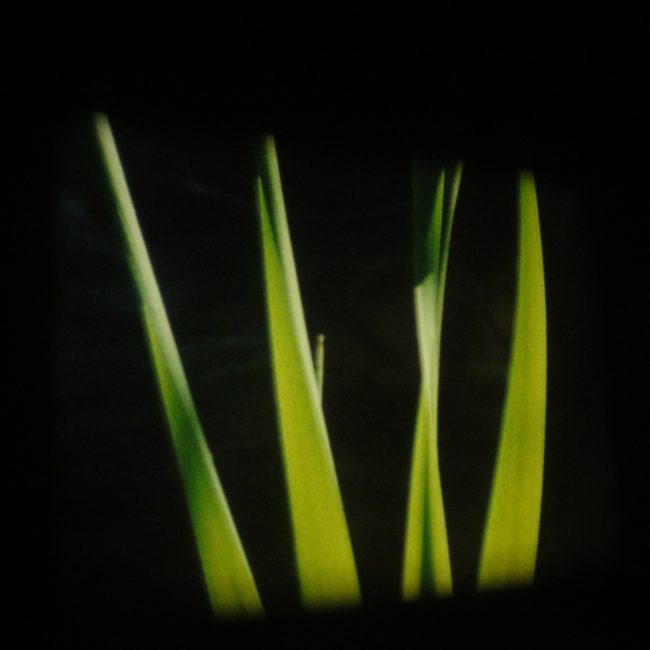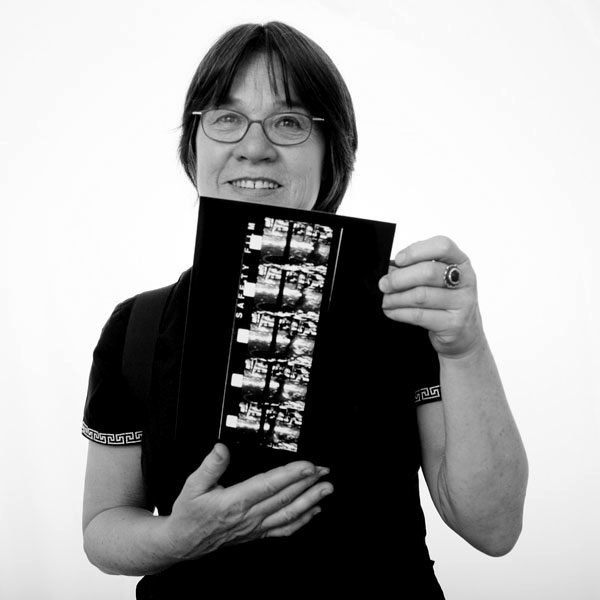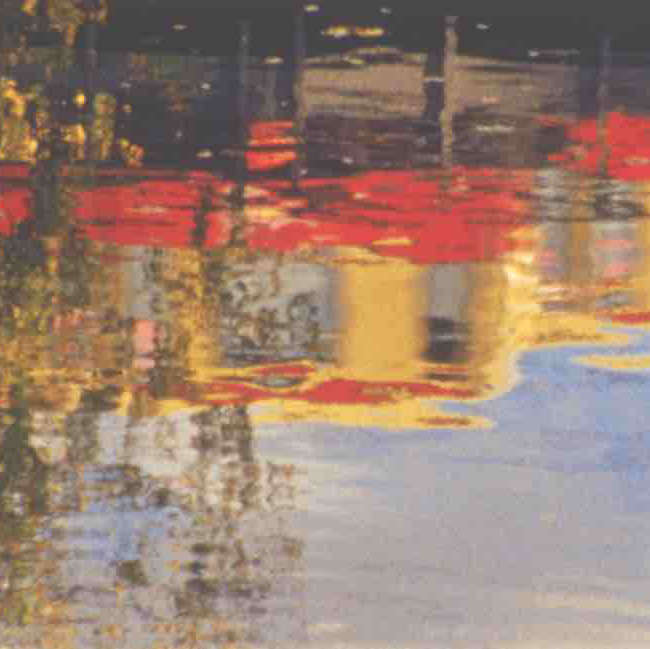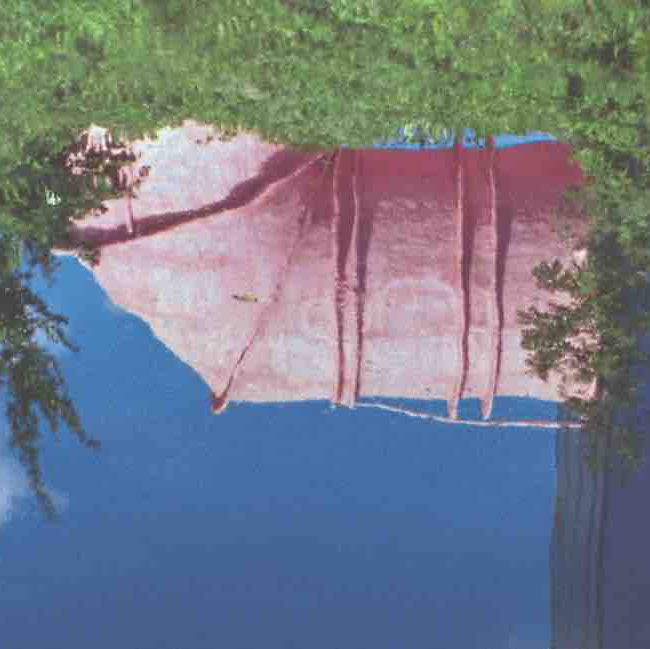
Helga Fanderl

Helga Fanderl
18 – 21 June 2024
2 – 6 pm
Exhibition opening with live projection and launch of KAMERA CAHIER N° 10
Monday, 17 June 2024, from 6 pm
Exhibition finissage with live projection and artist talk with Helga Fanderl and Achim Lengerer
Friday, 21 June 2024, 4 pm
Before discovering the Super 8 camera as her artistic medium in the mid-80s, Helga Fanderl was fascinated by literature, languages, and above all, poetry. Instead of expressing herself in words, she became a filmmaker. From 1987 to 1993, she attended the art schools Städelschule in Frankfurt/Main and Cooper Union in New York. Since then, she has developed a highly personal film practice and created a rich body of work. A lightweight Super 8 camera is her instrument. She finds her motifs out in the world, or – as she says – they find her. She reacts in situ to serendipitous discoveries, transferring experience and perception, atmosphere, feelings, and thoughts to her camera work, taking up and creating rhythms in correspondence with her motifs. Her short silent films are in-camera edited and, like sketches of drawings and paintings, they display and preserve the chronology and intensity of their creation.
Helga Fanderl creates constantly changing programs, multiple, potentially endless montages. Each of them consists of short pieces that form a ‘film’ for a single screening only, a dense and at the same time loose web of relationships, correspondences, and contrasts between motifs, colors, rhythms, and textures. The individual film, in combination with other films, can be read and understood in a new way.
Super 8 is a fragile medium and not a cinema format. Originally designed for amateur use, it has its own aesthetic qualities and requires a more intimate space. For this reason, the films are projected from a pedestal within the cinema room rather than from a booth. You hear the projector, you see the projection, and the person operating the projector. Every screening becomes a unique live event.
Helga Fanderl also presents her work in site-specific exhibitions and installations. Sometimes she transforms found spaces into ephemeral cinemas, and she also collaborates with other artists, including poets, musicians, and dancers.
Her films are shown worldwide in film museums, museums of fine arts, cinemas, film festivals, exhibition spaces, and galleries. Some of her films are in collections such as the Museum für Moderne Kunst, Frankfurt; Auditorium du Louvre, Paris; Centre Pompidou, Paris; Kinothek Asta Nielsen, Frankfurt; and Archiv für Bundesdeutschen Experimental- und Avantgardefilm von Frauen, Paderborn.
Helga Fanderl has received a number of awards, including the Coutts Contemporary Art Award (1992), the German Film Critics’ Award (1998, for Experimental Film), and the Cultural Award of Hesse (2000). She was also granted a residency from the Cultural Foundation of Hesse in Paris and published “fragil(e),” a book and DVD, Lowave, Paris (2006).
In 2023, the artist book *Helga Fanderl, Konstellationen Super 8 (G, F, E)* was published by Hatje Cantz, Germany. In the same year, Re:Voir in Paris released the DVD *Helga Fanderl, Constellations*.
Program
HELGA FANDERL
Tuesday, 18 – Friday, 21 June 2024
from 2 – 6 pm
Opening Monday, 17 June 2024, from 6 pm
Kamera Kino, live super 8 projection performed by the artist, 8:30 pm
Wednesday, 19 June 2024
Kamera Kino, live super 8 projection performed by the artist, 5 pm
Finissage
Friday, 21 June 2024
Kamera Kino, live super 8 projection performed by the artist, 4 pm
Artist Talk: Helga Fanderl in conversation with Achim Lengerer, 5 pm
Achim Lengerer will respond to Helga Fanderl’s cinematic practice and talk with the artist about her specific way of “making films”, influences and inspirations as well as her lifelong search for a highly personal and at the same time world-engaging way of filmmaking.
Artist and curator, Achim Lengerer works on political questions of speech and language that he thematizes in performances, radio plays or spatializes within installations, printed matter and publications. Since 2009, Lengerer runs the Berlin-based publishing and production house Scriptings.
scriptings.net
WHERE:
Labor Neunzehn
Kiefholzstr.19/20
12435 Berlin
LIMITED PLACES, register to reserve your place (free) >
kameraseries-HelgaFanderl.eventbrite.de
This event is kindly supported by Dezentrale Kulturarbeit Berlin-Treptow.
![]()
EIN WINDIGER FRÜHLINGSTAG
an installation by Helga Fanderl featuring a program of Super 8 films, books, sketches, analog equipment, various objects belonging to the artist, and live projections
FILM CONSTELLATIONS (2015 – 2024)
Super 8, silent, colour, 30 min program
Großes Karussell / Large Carousel
Gespiegelt / Mirrored
Umlauftank / Circulation Tank
Spielende Hunde / Playing Dogs
Schaukeln / Swings (2022)
Schwebende Wäsche / Suspended Laundry
Für R. / For R. (2024)
Wasserpflanzen / Water Plants
Kakifrüchte und Vögel / Persimmon fruit and Birds
Blätter auf dem Glasdach / Leaves on a Glass Roof
Zootiere und Architekturen / Zoo Animals and Architectures
Jardin d’Acclimatation I
Ein Windiger Frühlingstag / Super 8 transferred to digital
cahier n°10
Helga Fanderl.
fascinated by the intersection of visual art and cinema, her short poetic films evoke intense and sensitive experiences of the real world. – using a small hand-held super 8 camera, she creates filmic responses to her perceptions, weaving together imagery and emotions in dense, rhythmic patterns solely through in-camera editing. – she presents silent films in the form of ‘compositions’, crafting unique programs for site-specific personal projections and transforming spaces into temporary cinemas.
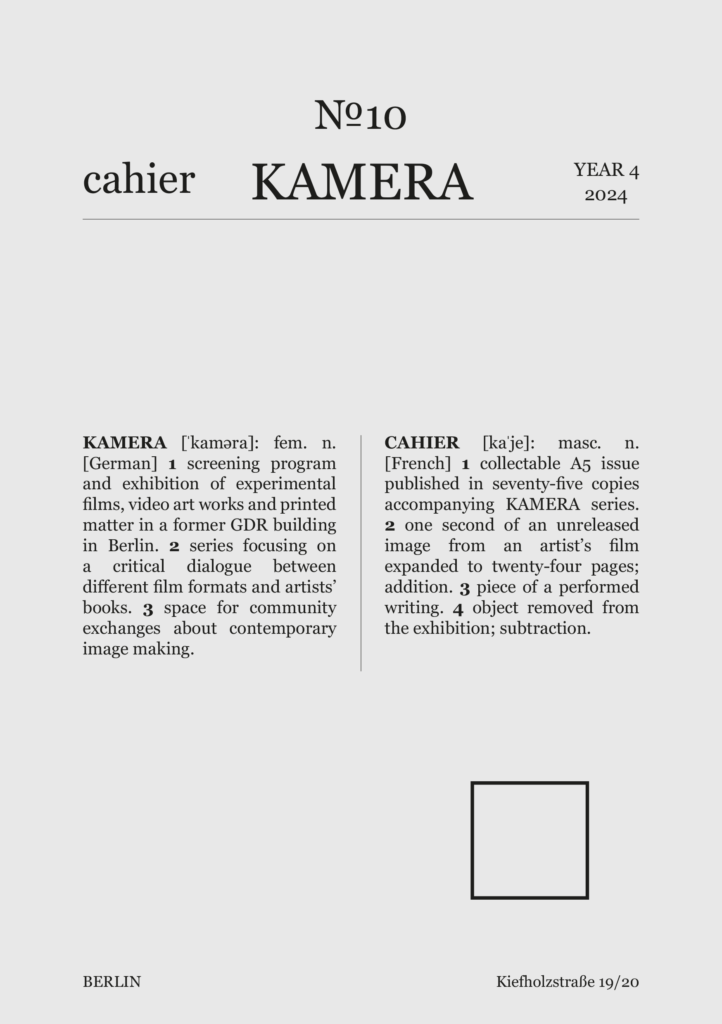
curated, designed and published by
AVARIE and Labor Neunzehn.
typeface
Magister by Aldo Novarese, 1966.
cover in letterpress
by Archivio Tipografico, Turin.
This program is generously supported by Dezentrale Kulturarbeit Berlin-Treptow

